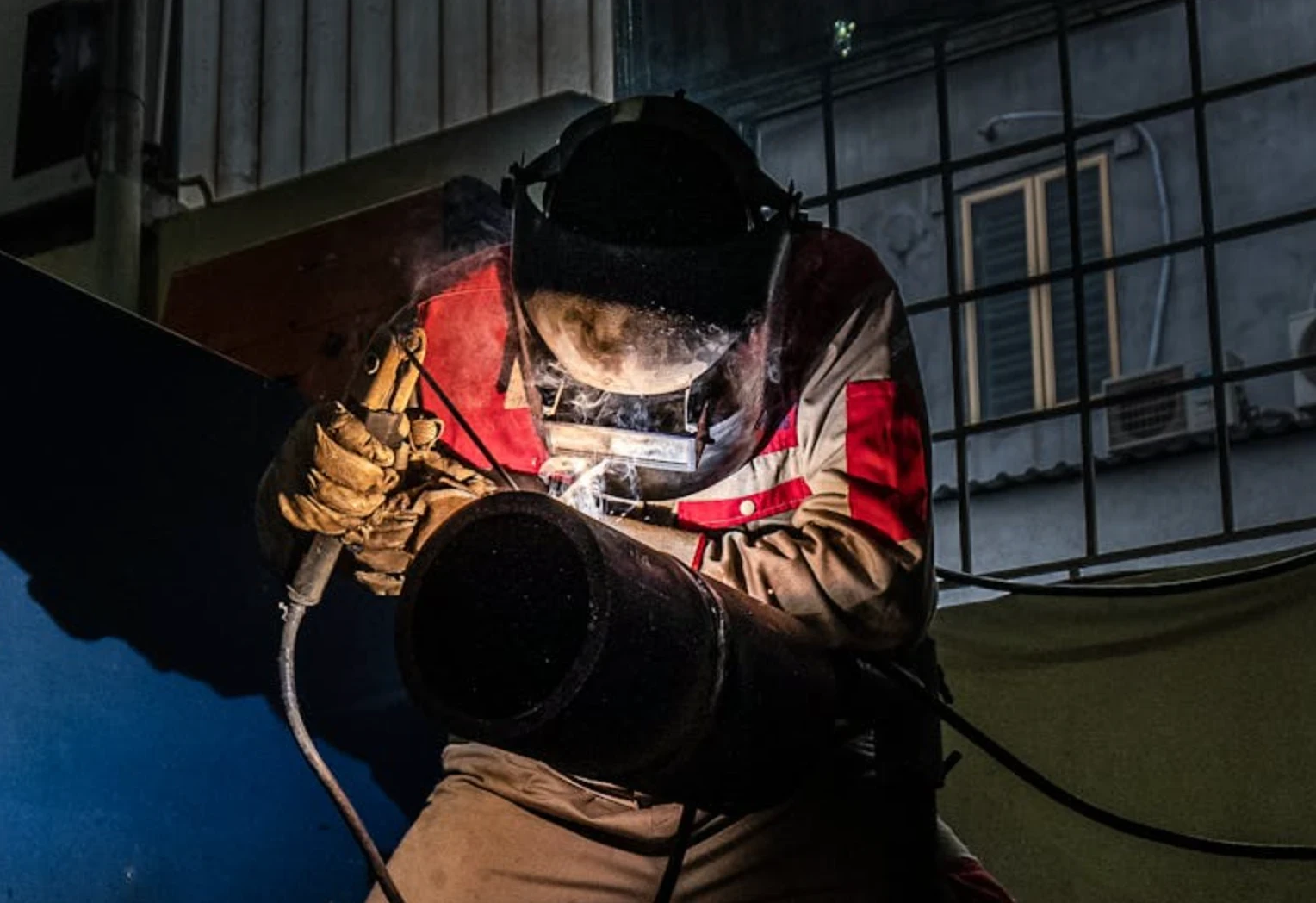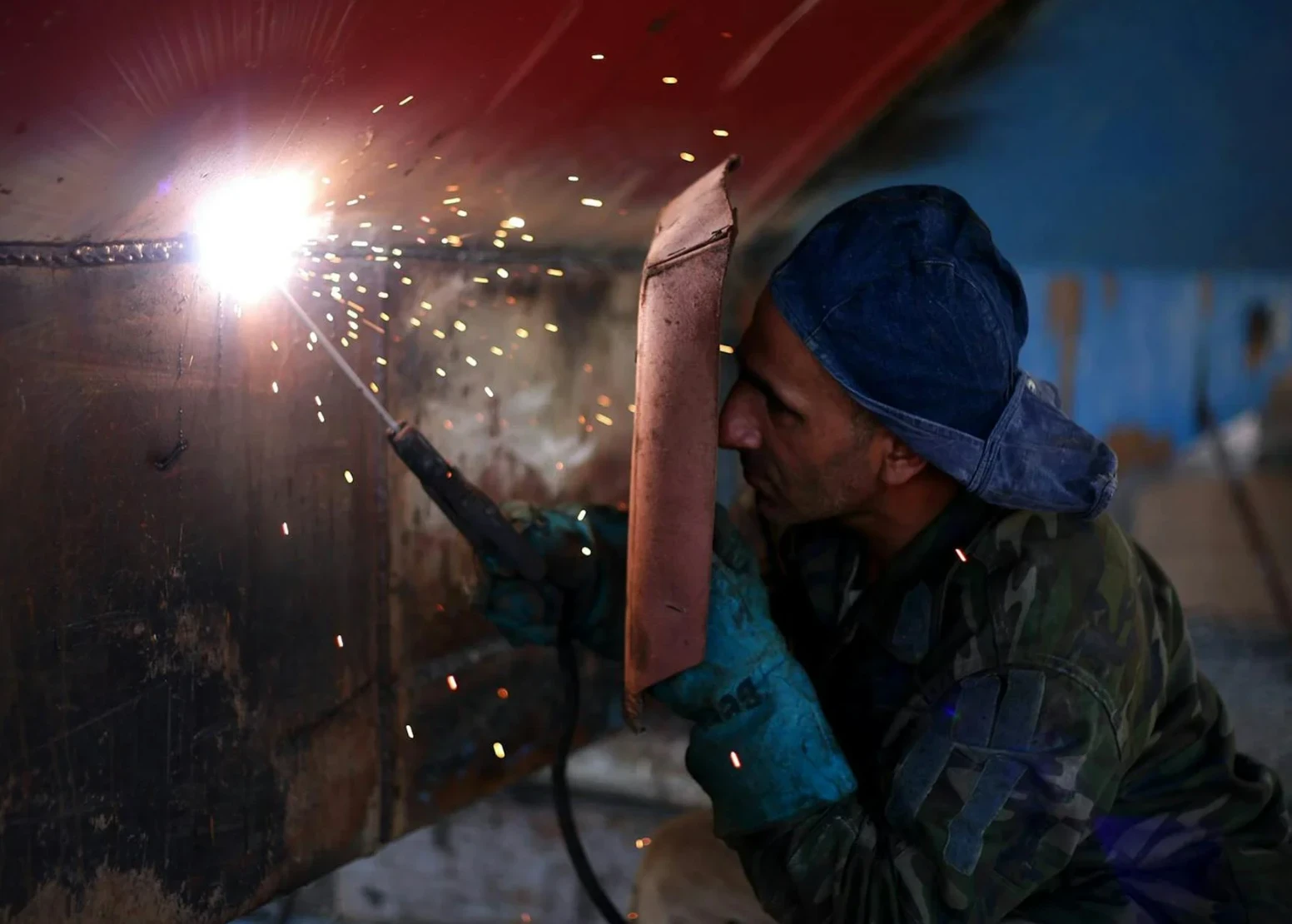If you think welding is just a regular job, think again. A certified welder can secure a high-paying position in the fabrication industry. With their specialized skills and years of experience, they can earn over $100,000 a year. 
High-paying welding jobs offer competitive salaries ranging from $60,000 to well over $100,000 annually. These roles frequently come with attractive benefits packages and opportunities for overtime pay. So, what kinds of welding careers fall into this lucrative category? This article will explore the top 12 highest-paying welding jobs that can lead to a financially rewarding career.
The Best Paying Welding Jobs of 2024
1. Underwater Welder ($53,990 - $115,540)
Underwater welders weld structures and components underwater. They work on offshore oil rigs, pipelines, ships, and marine construction projects. This job needs exceptional skills and certifications because of the challenging environment.
The average salary for underwater welders ranges from $53,990 to $115,540 per year. The highest-paid positions are usually in the commercial diving and offshore oil industries. Salaries depend on experience, location, project complexity, and diving depth.
Read Related: Lucrative Truth About Underwater Welding Salaries
To become an underwater welder, you need commercial diving certification and specialized welding certifications. Common certifications include ASME Underwater Welder, AWS D3.6 Underwater Welding Code, and ADCI certification.
Key skills for this role include scuba diving expertise, the ability to weld in harsh underwater conditions, and understanding of underwater welding processes and equipment. You also need physical stamina to work at significant depths for long periods. Strong problem-solving skills and attention to safety are essential.
2. Welding Engineer ($66,430 - $106,970)
Welding engineers design, develop, and improve welding processes, equipment, and materials. They work in industries like manufacturing, construction, energy, and aerospace, collaborating with production teams and other engineers.
The average salary range for welding engineers is $66,430 to $106,970 per year. Experienced engineers in specialized fields like aerospace or nuclear can earn higher salaries. Factors affecting pay include industry, location, company size, and years of experience.
To become a welding engineer, you typically need a bachelor's degree in materials engineering, metallurgical engineering, or a related field. Professional certifications like Certified Welding Engineer (CWEng) or Senior Certified Welding Inspector (SCWI) from the American Welding Society (AWS) are also highly valued.
Key skills for welding engineers include strong engineering knowledge, expertise in welding processes and metallurgy, problem-solving abilities, and attention to detail. Good communication skills are important. They must stay updated on welding codes, standards, and new technologies. Experience with computer-aided design (CAD) software and data analysis is also beneficial.
3. Welding Inspector ($41,800 - $95,590)
Welding inspectors examine welded materials and structures to ensure they meet quality and safety standards. They work in various industries like construction, manufacturing, and energy. Inspectors check welds visually and using testing methods. Their role is critical for preventing defects and ensuring structural integrity.
The average salary range for welding inspectors is $41,800 to $95,590 annually. Pay depends on factors like industry, location, experience, and specific certifications held. Inspectors in nuclear or oil and gas sectors tend to earn higher salaries. 
Key certifications for this job include Certified Welding Inspector (CWI) and Certified Associate Welding Inspector (CAWI) from the American Welding Society (AWS). Some employers may also require NDT (non-destructive testing) certifications.
Essential skills for welding inspectors are:
Strong attention to detail.
In-depth knowledge of welding codes and standards.
Ability to read blueprints and technical documents.
Excellent observational skills to identify defects.
Communication skills are also valuable for documenting findings and guiding teams.
4. Pipeline Welder ($37,420 - $90,210)
Pipeline welders specialize in welding pipes and pipelines for transporting oil, gas, and utilities like water or sewage. They work on new pipeline construction projects and maintenance and repair tasks on existing networks.
The typical salary range for pipeline welders is $37,420 to $90,210 annually. Higher pay is typical for those working on major pipeline projects, in remote locations, or on offshore rigs. Union membership can also increase earnings.
Pipeline welders need certifications specific to pipe welding processes like SMAW, GMAW, and FCAW from organizations like the American Petroleum Institute (API) or the American Society of Mechanical Engineers (ASME). OSHA safety certifications are often required, too.
Essential skills include expertise in pipe fitting and joining techniques, the ability to weld outdoors in challenging conditions, physical stamina for heavy labor, and the willingness to travel frequently for pipeline projects across different sites and locations.
5. Nuclear Welder ($46,430 - $85,330)
Nuclear welders fabricate and repair components within atomic power plants and facilities using specialized welding techniques. Given the critical nature of this work, they must follow stringent quality and safety protocols.
Salaries for nuclear welders typically range from $46,430 to $85,330 per year. Experienced welders working on complex projects or at nuclear utility plants tend to earn higher wages within this range.
To weld in the nuclear industry, certifications like ASME Nuclear Certification, AWS D1.1 Structural Welding Code - Steel, and ASME Section IX Welding and Brazing Qualifications are required. Many employers provide paid training to obtain these certifications.
Critical skills for nuclear welders include:
Expertise in welding processes suitable for atomic components.
Strict adherence to atomic codes and safety regulations.
Ability to read complex blueprints and technical documents.
Physical stamina and comfort working in regulated environments are also needed.
6. Aerospace Welder ($41,800 - $77,550)
Aerospace welders fabricate and repair parts and structures for aircraft, spacecraft, missiles, and other aerospace systems using specialized techniques like TIG, laser beam, and electron beam welding.
The average salary for aerospace welders falls between $41,800 and $77,550 annually. Those with extensive experience working on critical aerospace components can command higher wages within this range.
Major aerospace companies and organizations like the American Welding Society (AWS) typically set the certifications required. Typical certifications include AWS D17.1 for fusion welding in aerospace applications and company-specific certifications.
Essential skills are:
Precision welding abilities.
Proficiency in reading and interpreting blueprints and technical drawings.
Understanding of metallurgy and weld properties.
Attention to strict quality standards.
Commitment to safety protocols.
Some knowledge of geometric dimensioning and tolerancing (GD&T) is also beneficial.
7. Rig Welder (Oil & Gas) ($38,700 - $76,860)
Rig welders specialize in welding on offshore oil rigs and land-based oil and gas drilling sites. Their work involves repairing and maintaining equipment and structures used in exploration and extraction operations.
The typical salary range for rig welders is $38,700 to $76,860 per year. Those employed in the offshore oil industry or remote locations tend to earn higher wages due to hazardous conditions and travel requirements.
Rig welders need certifications specific to welding procedures used in the oil and gas industry from organizations like the American Petroleum Institute (API). Offshore rig welders also require certifications for welding in confined spaces and at heights.
Essential skills include the ability to weld in confined spaces and harsh environments, physical stamina to work long hours, understanding of safety protocols for rig operations, pipe welding expertise, and willingness to work at remote offshore or land-based rig locations for extended periods.
8. Military Support Welder ($32,700 - $68,240)
Military support welders construct, repair, and maintain equipment and structures used by the armed forces. They may work on military bases, vessels, aircraft, or in deployed field conditions supporting operations.
Salaries for military support welders generally range from $32,700 to $68,240 annually. Pay is influenced by rank, years of service, specific military branch, and whether serving in active duty or as a civilian contractor.
Military welders require certifications based on each branch's specific welding standards and procedures. Typical certifications include those from the American Welding Society (AWS) and military-issued qualifications.
Vital skills are the ability to follow military welding specifications precisely, expertise in various welding processes, capability to weld in field conditions or aboard ships/vehicles, understanding of military terminology and structures, and overall self-discipline.
9. Shipyard Welder ($36,300 - $66,510)
Shipyard welders specialize in welding operations and construct, repair, and maintain different types of marine vessels like ships, boats, barges, and offshore structures in shipyards.
The average salary range for shipyard welders is $36,300 to $66,510 annually. Experienced welders working on larger or more complex shipbuilding projects tend to earn higher wages within this range.
Standard certifications for this role include AWS D1.1 Structural Welding Code - Steel, AWS D1.6 Stainless Steel Welding Code, and shipyard-specific welder qualifications set by major shipbuilding companies.
Key skills are:
The ability to weld large structures.
Proficiency in multiple welding processes.
Knowledge of shipbuilding codes and standards.
Physical stamina to work in shipyard conditions.
Understanding of maritime terminology.
Comfort working at significant heights.
10. Robotic Welding Programmer ($41,800 - $66,510)
Robotic welding programmers develop and implement programs that control automated welding robots and systems used in manufacturing operations across various industries.
The typical pay range for this role is $41,800 to $66,510 per year. Programmers working with more advanced robotic systems or in specialized manufacturing sectors may earn toward the higher end of this range.
Typical certifications include Certified Robotic Arc Welding (CRAW) from the American Welding Society (AWS) and robotic programming certifications from manufacturers like FANUC, ABB, or Yaskawa.
Essential skills are programming abilities with languages like Python or robot-specific programming, expertise in setting up and integrating robotic weld cells, knowledge of automation and manufacturing processes, attention to detail, and problem-solving skills. Some hands-on welding experience is also valuable.
11. Certified Welding Instructor ($32,040 - $66,240)
Certified welding instructors teach welding techniques, theory, safety practices, codes, and other skills to students at vocational schools, community colleges, or company training programs. 
Salaries for certified welding instructors commonly range from $32,040 to $66,240 annually. Experience, education level, institution type, and geographic location can impact pay.
Required certifications typically include a teaching credential or career and technical education certification, along with various welding certifications from organizations like the American Welding Society (AWS) in the processes they plan to instruct.
Essential skills are expertise across multiple welding processes, instructional abilities, strong communication and presentation skills, patience for teaching adult learners, depth of knowledge in welding codes and standards, and dedication to promoting workplace safety.
12. Welding Supervisor/Manager ($45,480 - $81,750)
Welding supervisors and managers oversee welding operations, projects, personnel, and quality control and ensure compliance with regulations. They work in sectors like manufacturing, construction, energy, and more.
The average salary range is $45,480 to $81,750 per year. Those managing larger teams, more complex projects, or working in industries like aerospace or nuclear tend to earn toward the higher end of this range. Location and years of experience also impact pay.
Typical certifications include Certified Welding Supervisor (CWS) and Certified Welding Educator (CWE) from the American Welding Society (AWS). Supervisors may also need qualifications in safety, quality control, project management, and other relevant areas.
Essential skills include leadership abilities, knowledge of welding processes and codes, understanding of project management principles, communication skills, attention to detail, problem-solving skills, and familiarity with budgeting and scheduling. Prior hands-on welding experience is highly valuable.
Why Consider a High-Paying Welding Job?
1. Great money: High-paying welding jobs pay over $60,000 or even $100,000 annually. You can have financial security and a good lifestyle for your family. With the right skills and experience, welding can build wealth over time.
2. Many career options: Welding has so many specialties to choose from. You can explore underwater welding on offshore rigs—or aerospace welding on aircraft. There's also pipeline, nuclear, and oil rig welding. You can pick a path that matches your interests.
3. No degree required: Unlike most high-paying careers, welding jobs mainly need vocational training and certifications, not a four-year college degree. This makes welding an excellent option if you want a well-paid skilled trade without a university education.
4. Steady demand: There is always a high demand for skilled welders across various industries. This means stable employment and chances to advance your career as industries grow. Your specialized welding expertise will continue to be valued.
5. Travel opportunities: Some welding jobs like oil/gas and pipeline allow you to travel across regions or countries for projects. These roles can be very appealing if you enjoy new experiences and working at different sites.
Who Should Consider a High-Paying Welding Job?
People passionate about hands-on work with great attention to detail are ideal for high-paying welding jobs. If you like problem-solving daily in changing environments while feeling proud of the precise structures you create, consider welding careers seriously. These roles bring satisfaction from contributing quality work to big projects.
Those looking for a new career path without needing a four-year degree can explore welding. Many training programs provide focused, shorter paths to gain required skills and certifications faster. This allows transitioning into lucrative welding jobs more quickly.
Individuals from related manufacturing, construction, or engineering backgrounds also have an advantage in moving into specialized welding roles. Their existing hands-on experience provides a strong base for further specializing in advanced welding techniques and processes. Prior knowledge gives them an edge over other candidates.
However, remember that high-paying welding jobs often involve physically demanding work following strict safety rules. Thriving long-term requires having a solid work ethic, physical stamina, willingness to upgrade skills constantly, and ability to adapt to potentially tough working conditions at different sites. But for the right person, these roles bring immense rewards - both financial and from creating quality craftsmanship.
Things to Consider Before Pursuing a High-Paying Welding Job
Lots of training needed: You must complete extensive training programs. It would help if you also had specialized certifications from AWS, API, and ASME. Plan to study hard for qualifications in your chosen welding processes and industries. This requires big efforts over time.
Physically demanding work: Welding jobs can be extremely tough on your body. You may have to stand for many hours. You might work in awkward positions and lift very heavy equipment frequently. Safety is vital, too - you face risks like inhaling fumes, getting burned, or electric shocks. Following safety rules closely is a must.
Possibility of frequent travel: Some high-paying welding specialties require plenty of travel. Pipeline welding or offshore oil rig jobs often mean going to work sites in different regions or countries for long periods. You may need to live away from home for stretches.
Challenging work settings: Be ready to weld in demanding environments based on your expertise - extreme hot or cold temperatures, cramped spaces, hazardous locations like towering construction areas, or offshore rigs in open waters. Staying focused in tough settings is crucial for quality work.
Long hours and shift schedules: Overtime hours, night shifts, and irregular schedules are common for many major industrial welding projects operating 24/7. You must be flexible and have the stamina to work outside a regular 9-5 schedule.
Constant learning required: Welding is an industry that constantly changes with new techniques and technology updates. Keeping your welding skills sharp and certifications current through routine training is vital to qualify for the highest-paid positions over time.
Factors Affecting Welding Salaries
Welding salaries can vary significantly based on several key factors. To maximize your earning potential, it's important to understand what impacts pay in this field.
Experience is a major factor determining a welder's salary. Entry-level welders just starting can expect lower wages in the $30,000-$40,000 range annually. However, your value increases substantially as you gain more years of hands-on experience, especially with specialized processes. Experienced welders with 5-10 years under their belts can earn $50,000-$70,000. Highly skilled veterans with over ten years of expertise can command $70,000-$100,000+ salaries. 
Certifications also heavily influence pay. Welders with basic certifications qualify for more basic roles. However, those holding advanced certifications for specific codes like AWS D1.1, API 1104, ASME Section IX, etc., can pursue more technical, higher-paying positions. Underwater, aerospace, nuclear, and other specialty certs allow access to the highest tier of six-figure salaries.
The industry you work in makes a major difference. Oil/gas, aerospace, nuclear power, and other capital-intensive sectors prioritize specialist welding skills - resulting in premium pay. Manufacturing and construction offer good wages, too. However, other industries may pay at the lower end of salary ranges.
Geographic location impacts pay scales regionally and city-to-city based on costs of living and key local industries. Union membership can also increase wages through collective bargaining agreements.
Salary examples span a wide range. Entry-level welders may start at around $35,000. Experienced manufacturing welders can make $50,000-$70,000. Specialized nuclear, offshore, or rig welders working in Oil/Gas may earn $80,000-$110,000+. Supervisors overseeing major projects can make $100,000+ easily.
Continuous education is crucial in welding to maximize lifetime earnings. Investing in new certifications periodically unlocks access to higher-paying roles as your skills advance. Keeping up with new processes and technology keeps you competitive. Companies value individuals constantly upgrading their knowledge and capabilities.
FAQs on High-Paying Welding Jobs
Q. What factors contribute to higher welding salaries?
A. More experience, advanced certifications, specialized skills, working in lucrative industries like oil/gas or aerospace, high-paying locations, and union membership can increase welding pay.
Q. Is underwater welding as risky as it sounds?
A. Yes, underwater welding is extremely dangerous. Risks include breathing gases at high pressures, decompression sickness, hypothermia, poor visibility, and electrical hazards. Extensive safety training is required.
Q. Do military welders work in combat zones?
A. Some military welders may deploy to combat areas. But many work at bases, shipyards, or other support facilities instead of active combat.
Q. What's the role of a welding engineer?
A. Welding engineers design, develop, and improve welding processes, equipment, and techniques. They research to enhance efficiency, quality, and safety in welding operations.
Q. What are the safety precautions for underwater welders?
A. Key precautions include using proper life-support gear, following decompression procedures, avoiding electricity near water, monitoring gas supplies, and using welding cameras/lights. Rigorous training is mandatory.
Q. Are there female welders in these high-paying roles?
A. While historically male-dominated, more women now pursue lucrative welding careers, including high-risk specialties. However, representation is still relatively low in some sectors.
Q. How do I balance work-life as a rig welder?
A. Rig welding demands long stretches away at remote sites. Carefully schedule rotations for quality family time in between jobs.
Q. What is the future outlook for welding jobs?
A. Employment prospects for welders are projected to grow faster than average over the next decade across industries like construction and energy projects. Skilled tradespeople remain in demand despite some automation.
Q. Are there any age or physical limitations for welding jobs?
A. Most welding jobs are physically demanding, requiring overall good health and stamina. Good vision and mobility are also necessary. Some flexibility may exist for experienced older welders in less strenuous roles.
Q. How does the location or industry affect welding salaries?
A. High-paying industries like oil/gas, aerospace, and nuclear prioritize safety and skills by offering premium wages. Pay also varies regionally based on the cost of living and the presence of key industries.
Takeaway
Welding offers lucrative career paths with salaries over $100,000 for skilled professionals in specialties like underwater, nuclear, aerospace, and rig welding. While demanding, these rewarding roles allow hands-on work creating critical infrastructure. With the right training, certifications, and safety mindset, welding provides financial security without a four-year degree.
